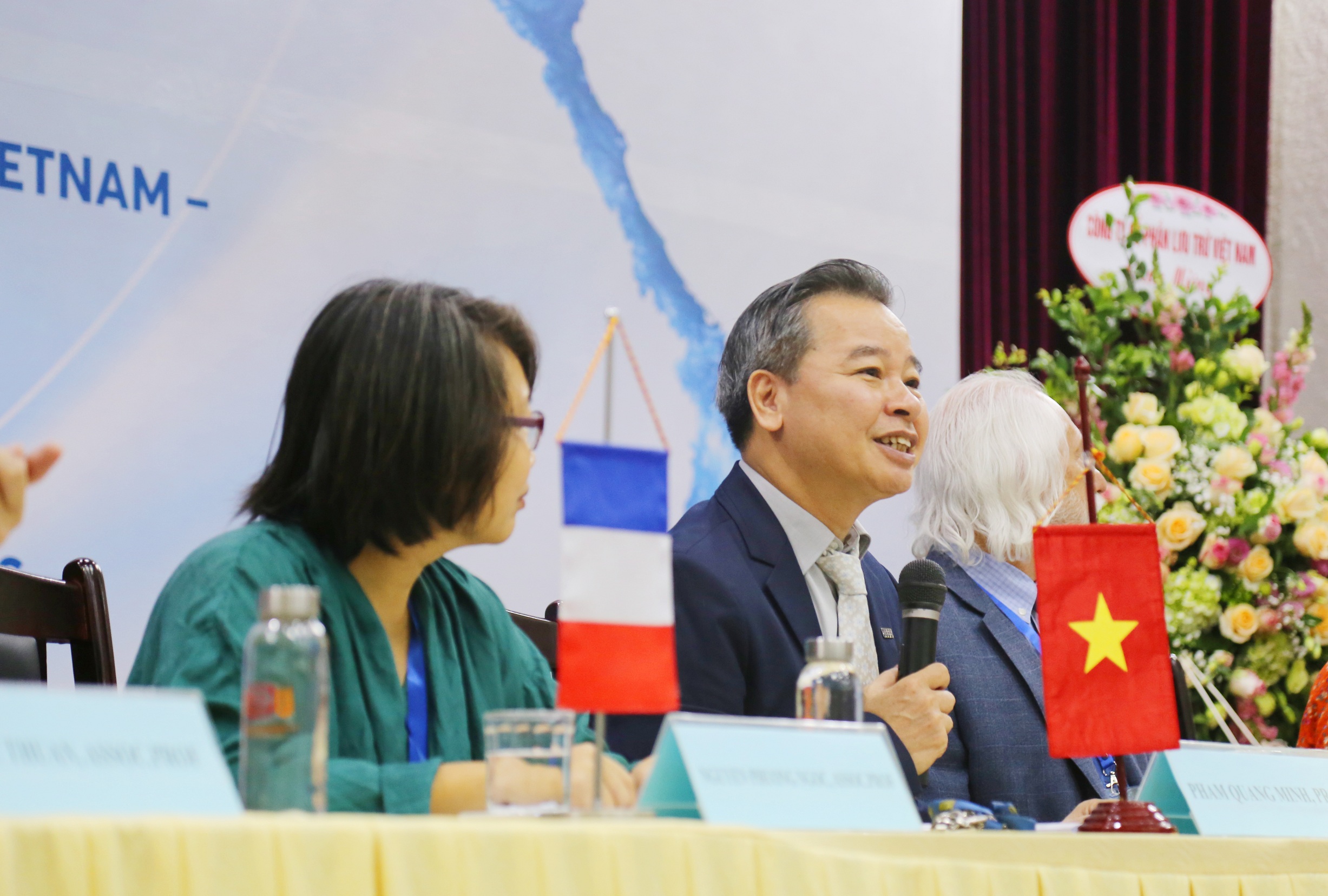
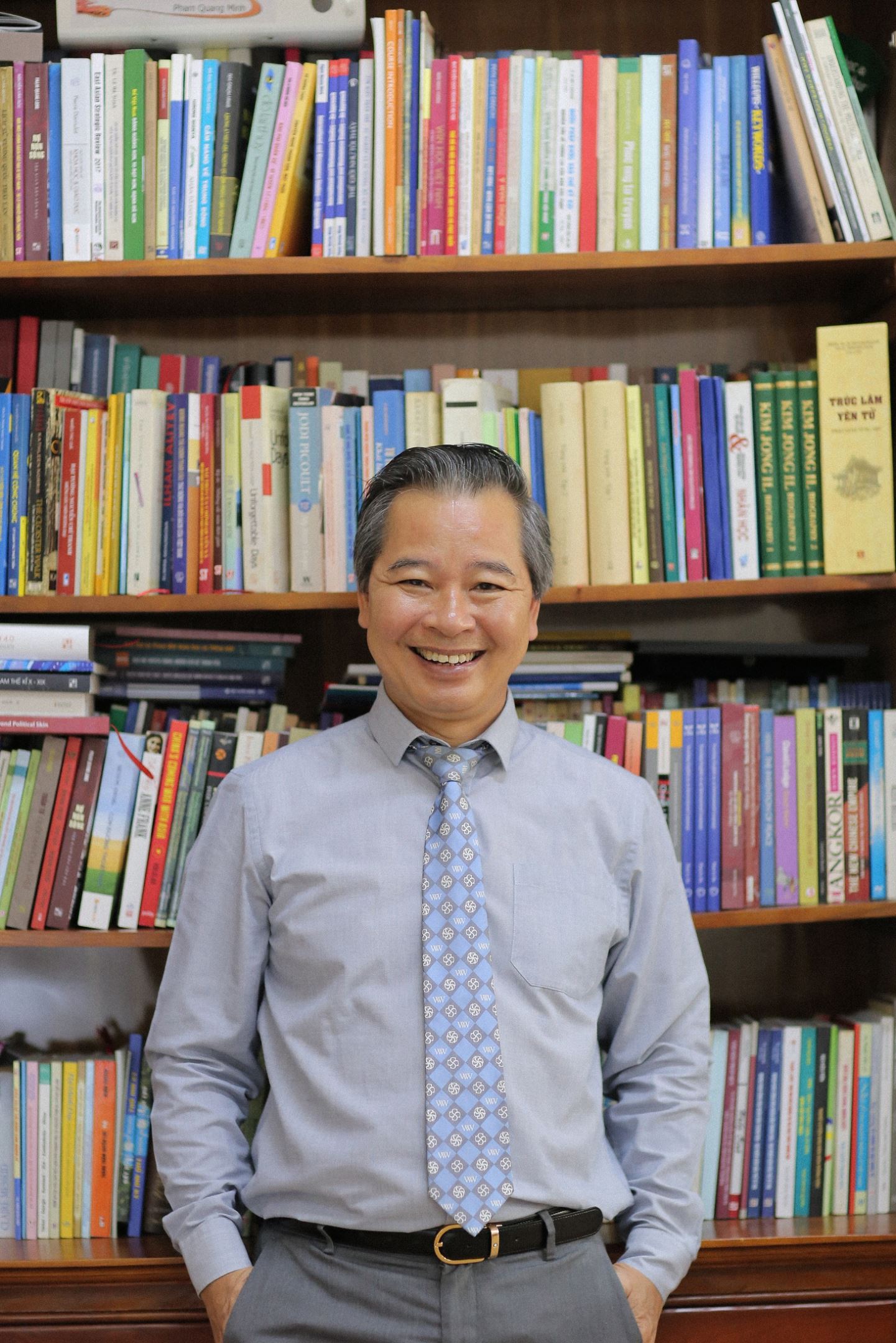
Prof. Dr. Pham Quang Minh - Rector of the University of Social Sciences and Humanities
The battle between the two systems
Journalist Phan Dang: Professor, one of the most heated international relations we've seen during the recent pandemic has been the relationship between the United States and China. Prior to President Donald Trump's phone call with Chinese leader Xi Jinping on March 27th, a war of words ensued between the two sides, with many expressions exceeding the bounds of diplomatic language. At that time, a spokesperson for the Chinese Ministry of Foreign Affairs wrote on social media that he suspected the US military had released the Coronavirus in Wuhan. The US immediately protested vehemently, and Donald Trump repeatedly referred to the virus as the "Chinese Virus." What is your personal assessment of this war of words?
Professor Pham Quang Minh:The COVID-19 pandemic occurred against the backdrop of a cooling of US-China relations since late 2019. However, the two sides have yet to reach a trade agreement to mend the rift in bilateral relations. Therefore, both sides are quietly preparing for a rearmament and a potential future conflict in the Asia-Pacific. Researchers have noted President Xi Jinping's declaration at the 19th National Congress of the Communist Party of China regarding the official policy of building a "world-class military," according to which the Chinese military will have "deterrence capabilities comparable to those of world powers," possess information superiority, focus on naval and air power, and promote "minimum nuclear deterrence capabilities." China's 2019 defense budget reached $177.61 billion, more than India, Japan, and South Korea combined.
At this rate, US-China relations could be pushed into a more challenging phase, not only significantly for the two countries themselves in the fight against the Covid-19 pandemic, but also for the world in the post-pandemic era. A China rapidly recovering from the pandemic signals a new risk to future international arrangements.
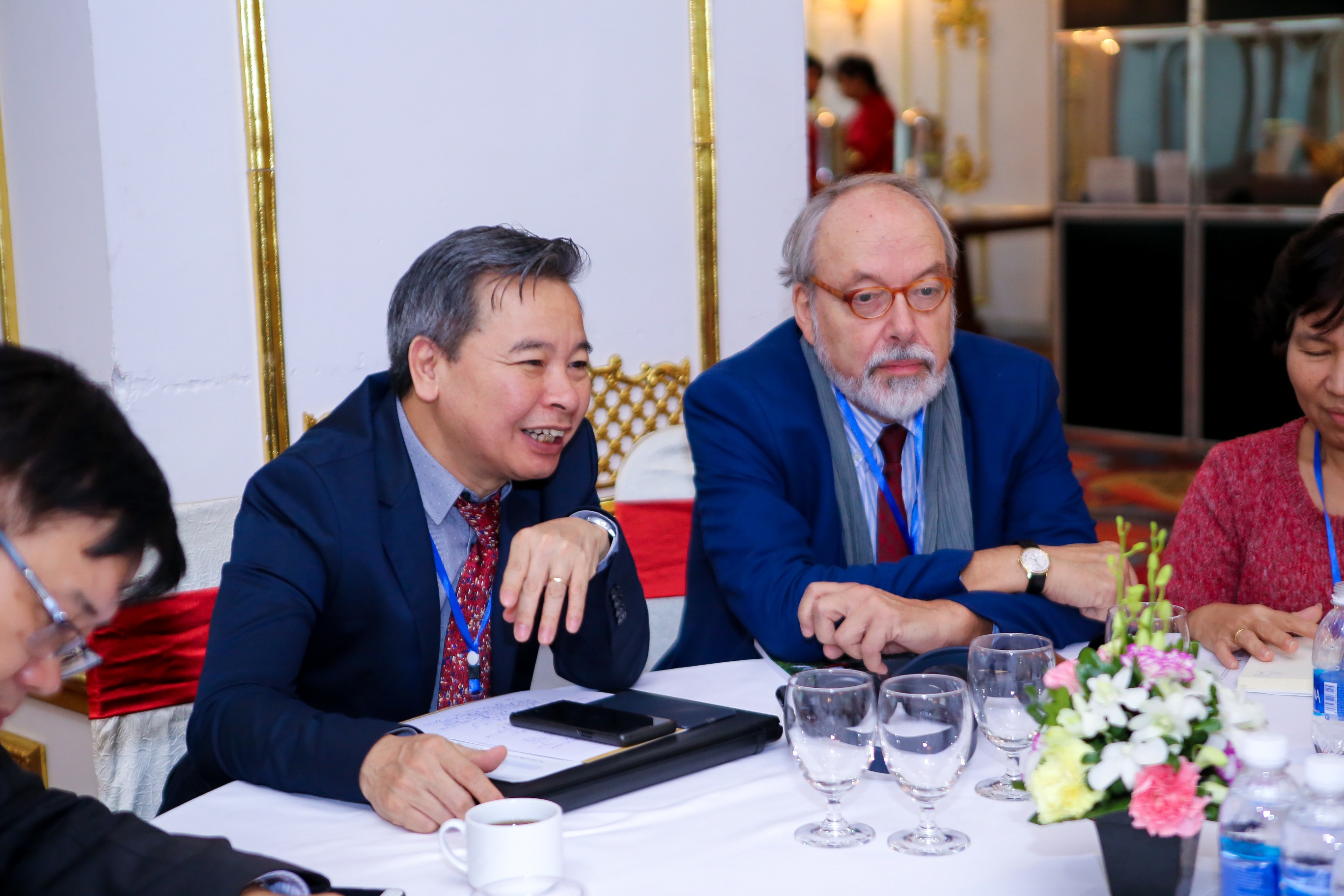
Professor Pham Quang Minh at a DAAD event.
Journalist Phan Đăng:Singapore Prime Minister Lee Hsien Loong said that if the US and China continue to blame each other, the world as a whole will not be able to resolve the current global pandemic crisis anytime soon. From his perspective, what would genuine cooperation between these two superpowers, at least during this critical time, mean?
Professor Pham Quang Minh:First and foremost, both the United States and China must recognize that the Covid-19 pandemic is a world war against the most serious and unprecedented invisible enemy facing humanity. As the world's two leading economies, the US and China have a responsibility to cooperate to help the world overcome this war. Their confrontational conflict is a failure of world politics, jeopardizing the mobilization of forces in this global struggle. The international community hopes and expects the two "giants" to act in a way that demonstrates cooperation, not confrontation.
The cooperation between the U.S. and China needs to be considered from the perspective of leadership culture. What is at stake now is global leadership. Two American Asia experts, Kurt M. Campbell, former Assistant Secretary of State for East Asian and Pacific Affairs under Obama, and Rush Doshi, were quite right when they argued that: "The United States' position as a global leader over the past seven decades has been built not only on wealth and power but, importantly, on the legitimacy of its governance, its provision of global goods, and its ability and willingness to coordinate and orchestrate a global response to crises."
While Washington remained indifferent, complacent, and dismissive of the pandemic, continuing its "America First" declaration, China quietly responded, secretly preparing and effectively allocating vast resources to fill the "power vacuum" and establish itself as a global leader in pandemic response.
Journalist Phan Đăng:For those reasons, is genuine cooperation between the US and China an impossible dream?
Professor Pham Quang Minh:News reports indicate that after recently blaming the US for bringing the coronavirus to Wuhan, Beijing is now calling on Washington to "unite" to combat the pandemic. On March 26, 2020, Chinese President Xi Jinping promised US President Donald Trump that China was "ready to share information and experience with the United States." However, experts believe that there will be no substantive cooperation between these two superpowers.
I want to emphasize this: the conflict between the two sides is not just a battle for "leadership" between two individuals representing two different viewpoints, but truly a battle of images between two systems: on one side, the American-style "liberal democracy," and on the other, the Chinese-style "authoritarian democracy." While China seeks to export its crisis management model, praised by the People's Daily on March 10th as "reflecting the significant advantages of the Chinese-style socialist system," the United States and Western countries are wary because it infringes on certain freedoms of the people. While China's motives might be to "undermine and replace US dominance in world affairs" through its so-called "mask diplomacy," the US is turning its back on allies, closing its borders with EU countries, and even seeking to "profit" from Germany's suffering, as President Trump on March 16 offered to pay CureVac approximately $1 billion for exclusive rights to a COVID-19 vaccine.
Journalist Phan Đăng:Listening to his analysis, I even shuddered at the thought of the US-Soviet confrontation during the Cold War!
Professor Pham Quang Minh: (Nod…).Many researchers also argue that the Covid-19 pandemic could push the US and China into a new Cold War. Unlike the Cold War of the 20th century between the US and the Soviet Union, the scale of this conflict would be far greater.
Journalist Phan Đăng:Could you please elaborate?
Professor Pham Quang Minh:The US and the former Soviet Union were primarily ideological adversaries, while today the US and China are both interdependent and competitive in all areas, from politics and economics to technology. If, in the old Cold War, the two countries mainly demonstrated their superiority by destroying each other through proxy wars, in this new Cold War, victory will belong to the country that finds a vaccine first and the country that emerges from its financial crisis first.
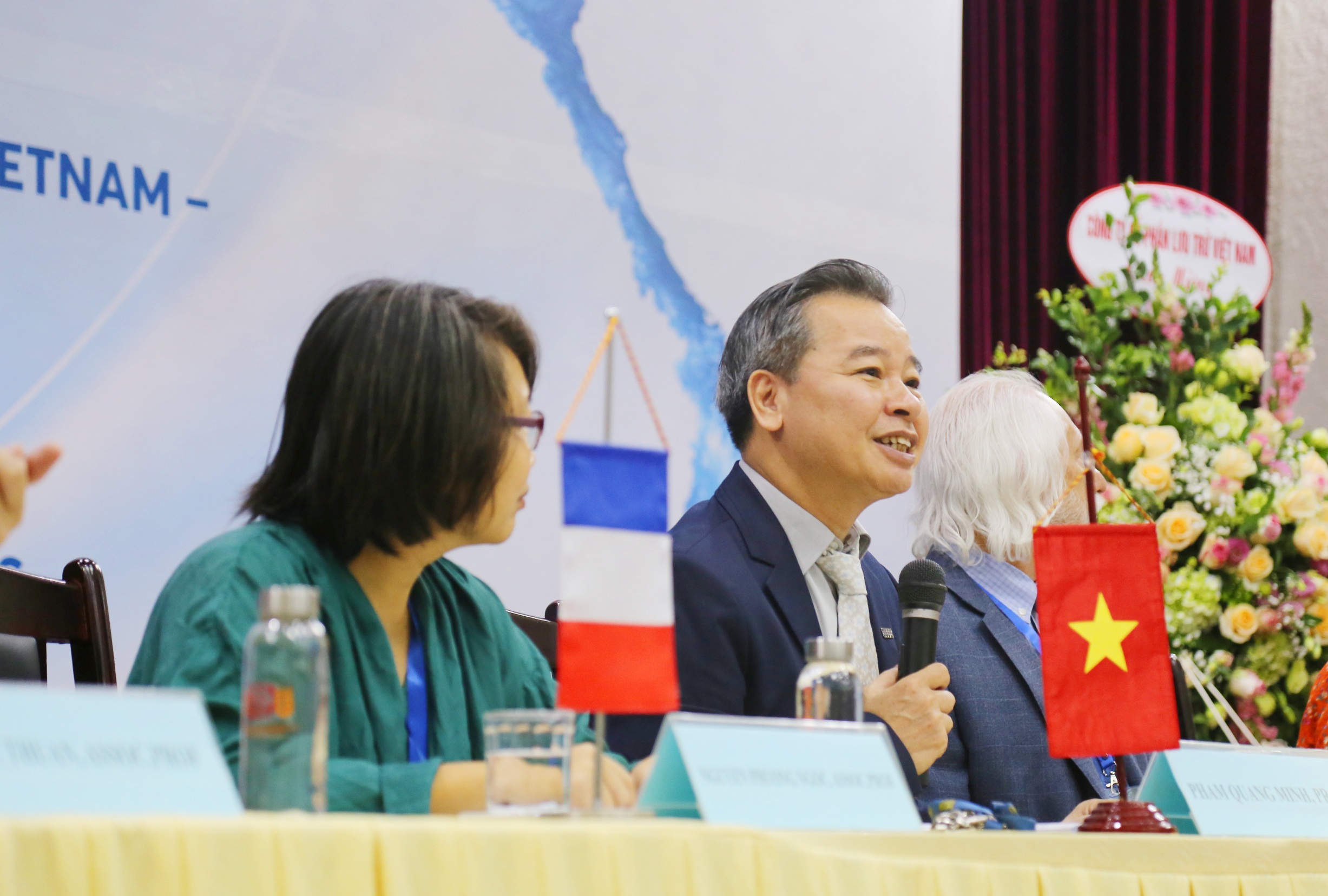
Professor Pham Quang Minh at an international conference on archival documents at the University of Social Sciences and Humanities.
America's "Suez moment"?
Journalist Phan Đăng:President Donald Trump consistently championed the slogan "America First." It was this slogan and this viewpoint that led the United States under Trump to withdraw from, or threaten to withdraw from, numerous international treaties that the US deemed detrimental to its interests, most notably the global climate change agreement. The way Trump prioritized "America First" and constantly asserted America's hard power diminished America's inherent soft power, not only in comparison to China, but globally.
Professor Pham Quang Minh: Absolutely! According to some American experts, the Covid-19 pandemic could be a decisive opportunity for the United States in the global political arena, as they compare the current situation of the US to Britain's failure in 1956 in the case known as the "Suez Canal." In an article written for the US State Department, these experts argue that Britain's 1956 plan to seize the Suez Canal "undermined British power and marked the end of the British monarchy as a global power." Similarly, they suggest that if the United States does not rise to the challenge of overcoming the Covid-19 pandemic and meet the demands of both the US and the world, the Covid-19 pandemic could mark another "Suez moment."
Journalist Phan Đăng:Donald Trump's predecessors always emphasized the concept of soft power – a term coined by Professor Joseph Nye (USA). The clearest example is President Bush's 2003 bailout package of $90 billion to help African countries combat the AIDS epidemic. But under Trump, things changed. Only after facing domestic criticism and international appeals did the US release a few hundred million dollars in aid to countries in Europe and Asia. What are your thoughts on this action?
Professor Pham Quang Minh:A decision made too late! There's a feeling that under President Donald Trump, America is no longer a model for the world due to its tendency to withdraw and prioritize its own interests. This trend is exacerbated by three factors: First, America has achieved relative independence in energy thanks to its abundant oil resources and shale gas extraction capabilities, reducing its dependence on foreign supplies. Second, its isolated geographical location, surrounded by the Atlantic Ocean to the east and the Pacific Ocean to the west, with only two neighbors – Canada to the north and Mexico to the south – allows for easy self-defense against foreign attacks or invasions. Third, America has a relatively strong population growth rate among developed countries, enabling it to solve its own problems, rely on its domestic market, and be less dependent on external sources. However, this inward-looking approach is not beneficial to the United States; it has not helped the US take the lead in many fields, has reduced friction and competition, and has shown signs of "falling behind" advanced countries. As a result, the influence of the United States is increasingly shrinking.
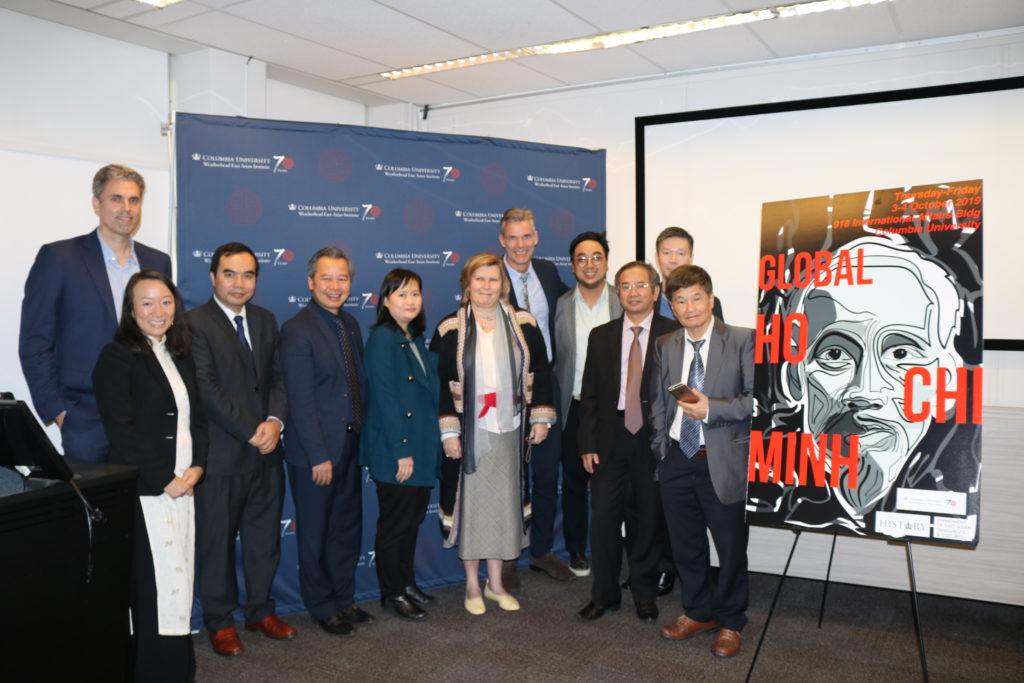
Professor Pham Quang Minh and American and Vietnamese scientists at the Global Ho Chi Minh conference in New York in 2019.
Journalist Phan Đăng:While the US is gradually losing its "soft power," some international commentators believe that China, with its "mask diplomacy" strategy, seems to be enhancing its image. Specifically, China is supplying masks to many countries at a time when masks have become more precious than ever. In your opinion, will this type of "mask diplomacy" elevate China's standing?
Professor Pham Quang Minh: China was once known for its "ping-pong diplomacy" on April 10, 1971, when it invited a delegation of American table tennis players to China after their participation in the Nagoya Olympics (Japan). This paved the way for the historic visit of US President Nixon in February 1972, thawing US-China relations during the Cold War and bringing China onto the international political stage as a major power. However, this time, "mask diplomacy" has failed to achieve what "ping-pong diplomacy" did. With "mask diplomacy," China hopes to send the message that, unlike the US, China is a responsible and reliable partner in the context of the COVID-19 pandemic devastating the world. However, some European countries have rejected medical equipment against the coronavirus manufactured in China. This could also undermine the country's "politics of benevolence."
The absence of the "elder brother"
Journalist Phan Đăng:Many politicians, including Singaporean Prime Minister Lee Hsien Loong, regret that the US is no longer acting as a benevolent "big brother" when the world faces a global crisis like it did before. Do you personally see the absence of a "big brother" in the current global fight against the pandemic?
Professor Pham Quang Minh:It's true that the world lacks not only a "big brother," but also faith in a global mechanism for dealing with crises. I remember that during the 2008 economic crisis and the 2014 Ebola epidemic, the United States assumed the role of global leader. But at this time, with the Covid-19 pandemic, the US government seems to be refusing to take on that leadership responsibility.
In my opinion, the world needs a global plan because the COVID-19 pandemic has now spread to over 200 countries and territories. Small-scale, self-serving plans are not the solution to a problem that is transnational, cross-border, and transcontinental like this one.
Just like in wartime, in the fight against the Covid-19 pandemic, countries also need to embrace humanitarian ideals, "humanizing" the production lines of essential equipment, sharing medical personnel, doctors, and nurses in the spirit of "mutual support" and "reciprocity," meaning that wealthier countries with fewer infections should share resources and finances with poorer countries with more infections.
Global cooperation is extremely important on the economic front. In the context of a developing global economy and supply chains, if each country decides its own destiny without regard for others, chaos and deep economic recession are almost inevitable. We need a global action plan, as soon as possible.
Similarly, suspending all travel may have somewhat limited the spread of the disease, but it will leave unpredictable consequences for the post-Covid-19 pandemic period. Leaders should have convened emergency meetings from the beginning to discuss and take joint action, instead of the belated online meetings that the G7 and G20 countries held. Relief packages only offer temporary solutions, but trust has been lost and insecurity persists.
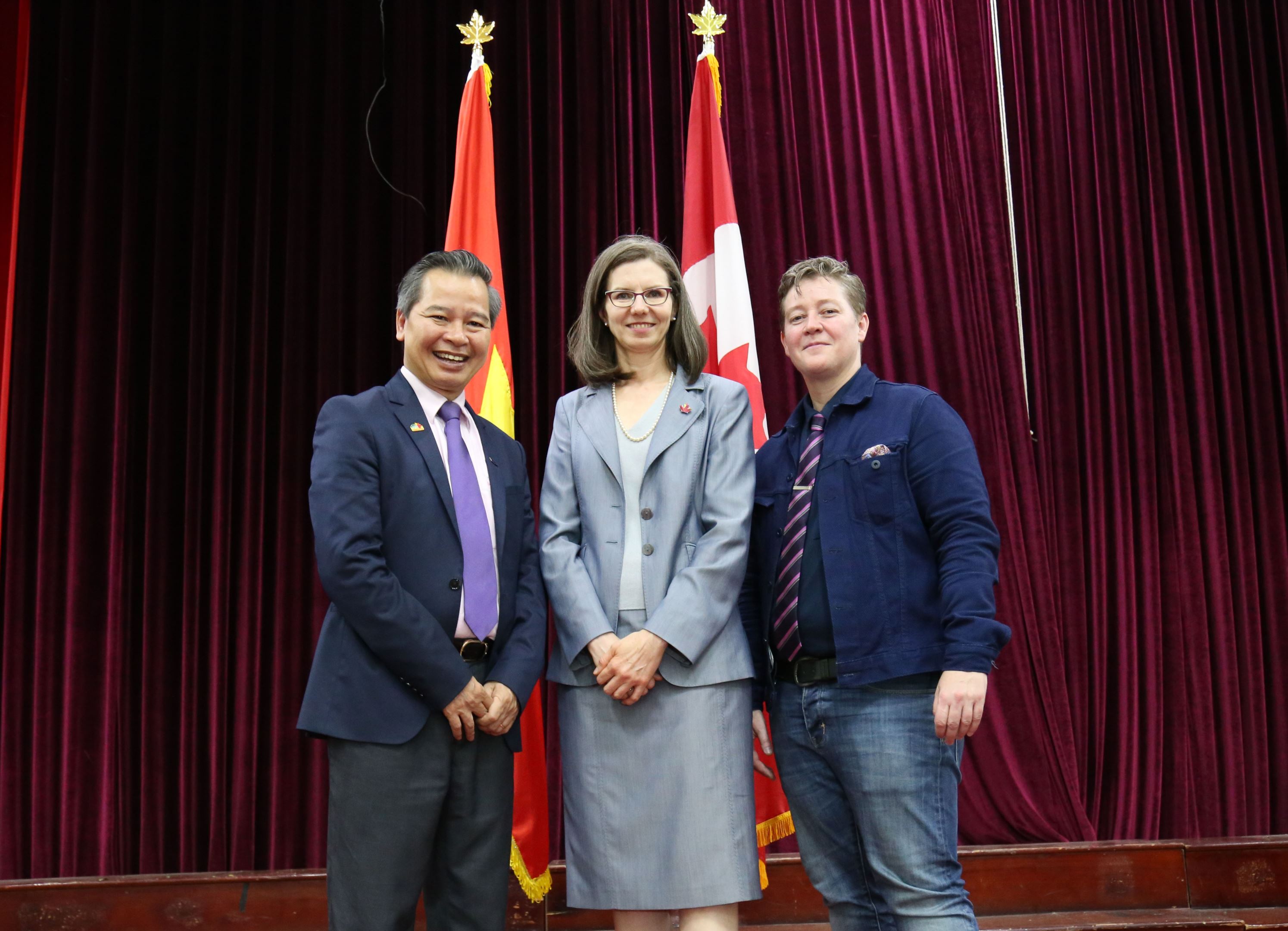
Professor Pham Quang Minh and the Canadian ambassador at a cultural exchange event at the University.
Journalist Phan Đăng: We're not going to talk about the "big brother" and the major powers anymore; we're going to talk about the smaller nations in the world. According to the World Health Organization (WHO), if left unchecked, many poor countries in Africa will face extreme hardship. What do you think of this assessment?
Professor Pham Quang Minh:I believe that if the Covid-19 pandemic truly spreads in Africa, it will become a super-pandemic. According to Bill Gates, founder of the Africa Foundation, the consequences of a pandemic in Africa could be even more severe than in China, potentially leading to the deaths of millions. The reason is that most African countries are underdeveloped. African countries cannot conduct testing and isolation of people with clinical symptoms of infection like developed, wealthy countries. If an outbreak occurs, poor African countries will certainly have to implement immediate centralized isolation measures because they lack the necessary testing facilities as advanced countries. Even centralized isolation is not easy for poor countries like Africa because they lack sufficient food, clean drinking water, and basic medical supplies for doctors, nurses, and patients. A shortage of hospital beds for patients is inevitable, leading to the extremely dangerous situation of patients wandering aimlessly. Although the COVID-19 pandemic situation in Africa is not as severe as in other regions, it has spread to 46 countries on the continent, especially South Africa and Nigeria, where nearly 80 million people are under lockdown.
Therefore, to avoid a catastrophe in Africa, developed countries, despite struggling with the Covid-19 pandemic, must now begin providing support to less developed countries, otherwise it will be too late. Developed countries like the G7 and G20 could consider canceling or extending bilateral debt, giving African countries peace of mind and allowing them to focus resources on the fight against the pandemic. They could also propose forming a common plan to help African countries, such as sharing information and experience, providing essential equipment and expert teams, and opening online training courses. Financial institutions like the World Bank and the IMF could postpone maturing debt payments, thereby providing African countries with much-needed financial resources.
Journalist Phan Đăng:After everything he has witnessed, does a long-time international affairs researcher like him have any questions about the future of global politics?
Professor Pham Quang Minh: The fight against the Covid-19 pandemic has raised many questions that remain largely unanswered. For example, what would you choose between privacy and health? What would happen if governments required their citizens to wear biometric bracelets to monitor their body temperature and heart rate 24/7? What would the world be like if we only worked from home and communicated online, from meetings and conferences to dating and teaching? Would we be safer? Would distance make people more distant? And would our society still be human if things continued like this?
Journalist Phan Đăng: Yes! Humanity will continue to ponder and seek answers to these fundamental questions. And hopefully, we will soon find the most reasonable solutions so that humanity will not ultimately be pushed into a "dehumanized" state as currently feared. Thank you very much, Professor!
|
3 differences of Vietnam
|
According to World Security
Author:Phan Đăng (compiled)